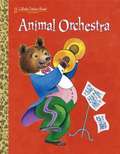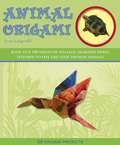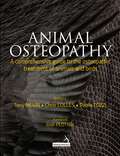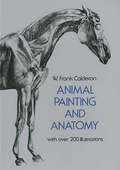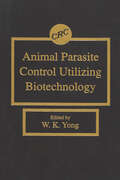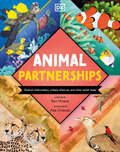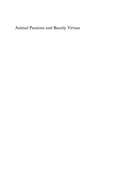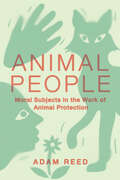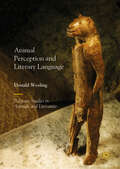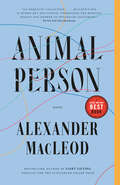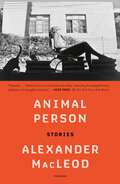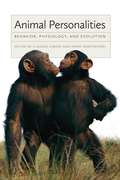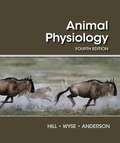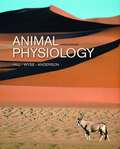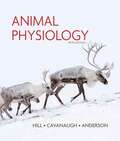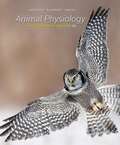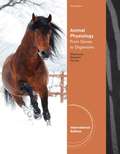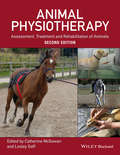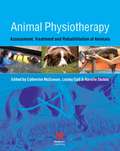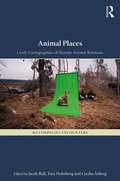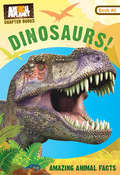- Table View
- List View
Animal Orchestra (Little Golden Book)
by Tibor GergelyThis rhyming story about an animal orchestra and its hippo conductor is perfect for reading aloud. Children will have front-row seats as they imagine the rousing experience of a night at the orchestra!
Animal Origami: 20 Origami Projects (Origami Books)
by Joost LangeveldBring your favorite animals to life with nothing more than a piece of paper! Animal Origami uses the art of folding to bring you into the wild world of the animal kingdom.Animal Origami offers animal lovers a chance to experience animals in an entirely new way—by creating them! This fun and informative book offers instructions for crafting crabs, cows, dinosaurs, ladybugs, and more.Animals can be intriguing, fun, and fascinating—and with Animal Origami, making them can be all those things too!
Animal Osteopathy: A comprehensive guide to the osteopathic treatment of animals and birds
by Christopher Colles Anthony Nevin Paolo TozziThis is a comprehensive reference textbook for all those using osteopathic treatment techniques with animals or birds or studying to do so. The book is divided into sections: equine osteopathy; general small animal osteopathy; osteopathy for exotics- (pets such as tortoise, snakes, ferrets etc); osteopathy for wildlife - native as well as non to the UK including species found in most zoological collections; avian osteopathy - both domestic and wild/exotic. Each section covers information specific to that group. This makes the book appropriate for supporting structured post-graduate university validated courses in a clear and easily navigable way.Content includes detailed sections on the differences encountered when working with animals; health and safety around different species; working within the law; integrating with allied professions; anatomy; physiology and patho-physiology; neurology; orthopaedics; differential diagnosis; differential aetiology of presenting conditions when compared to the human model; supportive husbandry and rehabilitation methods.It includes sections covering approaches to patient care; specifics of taking a detailed case history; use of supporting diagnostics; observation; palpation; structuring a treatment programme suitable for each species. Osteopathic treatment techniques and physical patient contact methods are be explained as well as graphically illustrated. All chapters are fully referenced and include revision notes to act as guidelines for the reader.It is intended primarily for post-graduate osteopaths intending to work with animals or who are already doing so. It will also strongly appeal to vets as well as to other allied professions working with animals (eg massage therapists).
Animal Painting and Anatomy
by W. Frank CalderonDrawing is "the very essence of all pictorial art," and this book approaches the challenging art of animal painting from the point of view of accurate representation of animal subjects on canvas. Combining useful information on important anatomical features with direction on how to handle the subjects and how to express their forms and postures, the author has produced a complete, inexpensive, at-home course in animal painting and anatomy.All aspects of animal drawing and painting are covered: drawing from life; anatomy in relation to drawing (not surgical anatomy, but a precise knowledge of the visible structure and movements of animals); characteristic movements of animals and suggestions on how to capture them in your picture; composition (design, restraint, rhythm, balance of light and shade, relative scale of animals and landscape, foregrounds); painting and color. 36 illustrations, mostly sketches by the author, depict horses, pigs, cows, dogs, and other animals in various life positions and movements. A long, detailed discussion of the anatomy of animals completes the book. Here Mr. Calderon describes all the structures of animals that are of significance to the artist: the vertebral skeleton, the bones and muscles of the head, the muscles of the vertebral skeleton, the fore-limb and its muscles, the muscles attaching the shoulder blade to the trunk, and the bones and muscles of the hind limb. 208 drawings accompany these discussions and show you how anatomy is related to surface contours and techniques of shading.
Animal Parasite Control Utilizing Biotechnology
by Weng K. YongThis volume emphasizes the application of modern biotechnological approaches to the study and control of animal parasites. The book begins by discussing molecular concepts and principles in general before moving on to cover specific applications for endoparasites, ectoparasites, and finally the hosts themselves. Animal Parasite Control Utilizing Biotechnology will be an instrumental reference in promoting a better understanding of the host-parasite relationship and suggesting viable means of controlling economically important parasite infections of animals. The book will be invaluable to zoologists, parasitologists, microbiologists, biochemists, geneticists, immunologists, physiologists, molecular biologists, veterinarian and medical scientists, and advanced students interested in the topic.
Animal Parasites: Diagnosis, Treatment, Prevention
by Heinz MehlhornThis textbook focuses on the most important parasites affecting dogs, cats, ruminants, horses, pigs, rabbits, rodents, birds, fishes, reptiles and bees. For each parasite, the book offers a concise summary including its distribution, epidemiology, lifecycle, morphology, clinical manifestations, diagnosis, prophylaxis and therapeutic measures. Numerous informative tables and more than 500 color micrographs and schemes present the most important aspects of the parasites, their induced diseases and the latest information on suitable prevention and control measures. 100 questions at the end of the book offer readers the chance to test their comprehension. The book is well suited as both a textbook and a reference guide for veterinarians, students of the veterinary and life sciences, veterinarian nurses, laboratory staff, and pet and livestock owners.
Animal Partnerships: Radical Relationships, Unlikely Alliances, and Other Animal Teams (Wonders of Wildlife )
by Ben HoareDiscover a whole host of partnerships from across the animal kingdom, with the nature enthusiast and best-selling author Ben Hoare.Get acquainted with unexpected animal teams around the world, and find out how these groups thrive in the wild as they defend, feed, and plot with each other in order to survive in this fascinating and unique look at animals.Presenting these unpredictable discoveries, Ben Hoare's friendly, informative explanations are paired with striking photographs and colorful illustrations to make sure every page captivates the imagination. This unique animal book for children offers: Groundbreaking scientific discoveries, including animal behaviors that have only just been documented.Impressive facts about previously unknown animal behaviors that are guaranteed to wow adults and children alike.Animals shown in incredible detail through photographs paired with charming illustration.Animal Partnerships explores cooperative relationships between sea turtles at underwater "cleaning stations" ran by surgeon fish, “bands of brothers” within particular species of big cats, and even cross-species alliances between birds and dolphins that are hungry for a shared meal. Discover how animals and plants depend upon each other to hold their territory, and how even humans have come to develop partnerships with animals all around the world.
Animal Passions and Beastly Virtues: Reflections on Redecorating Nature
by Jane Marc Bekoff GoodallWho hasn't wondered what it's like to be a dog or bird? Such questions seem unanswerable because we have no way of getting into an animal's mind. Marc Bekoff's work on animal behavior and mind draws world-wide attention for its originality and its probing into what animals might know as well as what skills (mental and physical) are needed to live life successfully as a member of a particular species. Convinced that individuals of every species have some level of self-awareness, Bekoff embarks on fascinating (and often amusing) observations of animals playing, leaving and detecting scent-marks, solving problems, and behaving fairly toward each other. Animal Passions and Beastly Virtues brings together some of his path-breaking research papers, essays on science and ethics, and popular articles in order to reveal a remarkable range of animal behaviors but also to argue that the ethical treatment of animals is an especially significant issue now.
Animal People: Moral Subjects in the Work of Animal Protection (Expertise: Cultures and Technologies of Knowledge)
by Adam ReedAnimal People introduces readers to the professionalized world of animal protection from the perspective of those who consider themselves to be "moderate" activists. Adam Reed explores the interrelationships between moral cause and organizational culture, including the ways in which expert roles such as investigator and lobbyist inform the practice and outlook of animal protection. This book examines not only connections between forms of professionalism and everyday advocacy but also how those working to improve the welfare of animals can come to possess an expertise in public or mainstream ethics.Reed explores these issues through the example of a Scottish-based animal protection organization. Animal People makes a distinctive contribution to anthropological debate and discussion relating to human and nonhuman animal interactions, activism, and the attributions and imperatives of moral action.
Animal Perception and Literary Language (Palgrave Studies in Animals and Literature)
by Donald WeslingAnimal Perception and Literary Language shows that the perceptual content of reading and writing derives from our embodied minds. Donald Wesling considers how humans, evolved from animals, have learned to code perception of movement into sentences and scenes. The book first specifies terms and questions in animal philosophy and surveys recent work on perception, then describes attributes of multispecies thinking and defines a tradition of writers in this lineage. Finally, the text concludes with literature coming into full focus in twelve case studies of varied readings. Overall, Wesling's book offers not a new method of literary criticism, but a reveal of what we all do with perceptual content when we read.
Animal Person: Stories
by Alexander MacLeodFrom Giller Prize finalist Alexander MacLeod comes a magnificent collection about the needs, temptations, and tensions that exist just beneath the surface of our lives. Named a Canadian Fiction title to watch by the CBC, Quill & Quire, and 49th Shelf. Featuring stories published in The New Yorker, Granta, and the O. Henry Prize Stories.Startling, suspenseful, deeply humane yet alert to the undertow of our darker instincts, the eight stories in Animal Person illuminate what it means to exist in the perilous space between desire and action, and to have your faith in what you hold true buckle and give way. A petty argument between two sisters is interrupted by an unexpected visitor. Adjoining motel rooms connect a family on the brink of a new life with a criminal whose legacy will haunt them for years to come. A connoisseur of other people&’s secrets is undone by what he finds in a piece of lost luggage. In the wake of a tragic accident, a young man must contend with what is owed to the living and to the dead. And in the O. Henry Award-winning story &“Lagomorph,&” a man&’s relationship with his family&’s long-lived pet rabbit opens up to become a profound exploration of how a marriage fractures. Muscular and tender, beautifully crafted, and alive with an elemental power, these stories explore the struggle for meaning and connection in an age when many of us feel cut off from so much, not least ourselves. This is a collection that beats with raw emotion and shimmers with the complexity of our shared human experience, and it confirms Alexander MacLeod&’s reputation as a modern master of the short story.
Animal Person: Stories
by Alexander MacLeodThe highly anticipated new book of short fiction from the O. Henry Prize winner Alexander MacLeod—a magnificent collection about the needs, temptations, and tensions that exist just beneath the surface of our lives.Startling, suspenseful, and deeply humane, yet alert to the undertow of our darker instincts, the eight stories in Animal Person illuminate what it means to exist in the perilous space between desire and action, and to have your faith in what you hold true buckle and give way.A petty argument between two sisters is interrupted by an unexpected visitor. Adjoining motel rooms connect a family on the brink of a new life with a criminal whose legacy will haunt them for years to come. A connoisseur of other people’s secrets is undone by what he finds in a piece of lost luggage. In the wake of a tragic accident, a young man must contend with what is owed to the living and to the dead. And in the O. Henry Prize–winning story “Lagomorph,” a man’s relationship with his family’s long-lived pet rabbit opens up to become a profound exploration of how a marriage fractures.Muscular and tender, beautifully crafted, and alive with an elemental power, these stories explore the struggle for meaning and connection in an age when many of us feel cut off from so much, not least ourselves. This is a collection that beats with raw emotion and shimmers with the complexity of our shared human experience, and it confirms Alexander MacLeod’s reputation as a modern master of the short story.
Animal Personalities: Behavior, Physiology, and Evolution
by Claudio Carere and Dario MaestripieriAsk anyone who has owned a pet and they’ll assure you that, yes, animals have personalities. And science is beginning to agree. Researchers have demonstrated that both domesticated and nondomesticated animals—from invertebrates to monkeys and apes—behave in consistently different ways, meeting the criteria for what many define as personality. But why the differences, and how are personalities shaped by genes and environment? How did they evolve? The essays in Animal Personalities reveal that there is much to learn from our furred and feathered friends. The study of animal personality is one of the fastest-growing areas of research in behavioral and evolutionary biology. Here Claudio Carere and Dario Maestripieri, along with a host of scholars from fields as diverse as ecology, genetics, endocrinology, neuroscience, and psychology, provide a comprehensive overview of the current research on animal personality. Grouped into thematic sections, chapters approach the topic with empirical and theoretical material and show that to fully understand why personality exists, we must consider the evolutionary processes that give rise to personality, the ecological correlates of personality differences, and the physiological mechanisms underlying personality variation.
Animal Physiology
by Margaret Anderson Richard W. Hill Gordon A. WyseAnimal Physiology presents all the branches of modern animal physiology with a strong emphasis on integration of physiological knowledge, ecology, and evolutionary biology. Integration extends from molecules to organ systems and from one physiological discipline to another.
Animal Physiology
by Margaret Anderson Richard W. Hill Gordon A. WyseAnimal Physiology presents all the branches of modern animal physiology with a strong emphasis on integration of physiological knowledge, ecology, and evolutionary biology. Integration extends from molecules to organ systems and from one physiological discipline to another. The book takes an entirely fresh approach to each topic. Its full-colour illustrations include many novel, visually effective features to help students learn. Each of the 25 main chapters starts with a brief animal example to engage student interest and demonstrate the value of the material that will be learned. The book includes five additional, briefer 'At Work' chapters that apply students' newfound physiological knowledge to curiosity-provoking and important topics, including diving by marine mammals, the mechanisms of navigation, and muscle plasticity in use and disuse. The book is committed to a comparative approach throughout. Whereas mammalian physiology is consistently treated in depth, emphasis is also given to the other vertebrate groups, arthropods, molluscs, and-as appropriate-additional invertebrates. Concepts and integrative themes are emphasized while giving students the specifics they need. The whole animal is the principal focus of this book. The pages are filled with information on everything from knockout mice, genomics, and enzyme chemistry to traditional organ physiology, phylogenetic analysis, and applications to human affairs. Always, the central organizing principle for the array of topics presented is to understand whole animals in the environments where they live. Complex principles are developed clearly and carefully to help students understand important concepts in sufficient depth without being overwhelmed. Pedagogical aids include embedded summaries throughout chapters, study questions, partially annotated reference lists, an extensive glossary, appendices, and an upgraded index.
Animal Physiology
by Knut Schmidt-NielsenIn this revised, updated, two-color edition of the acclaimed text Animal Physiology, Knut Schmidt-Nielsen introduces and develops the fundamental principles of animal physiology according to major environmental features--oxygen, food and energy, temperature, and water. The book is structured the same as the previous edition, but every chapter has been updated to take into account recent developments, with numerous new references and figures. New and expanded features include: extensive modifications to the chapter on Movement, Muscle and Biomechanics; new material on respiratory pigments; feeding and digestion in shrimp and hoatzin; plant defense compounds; diving in seals; high temperature tolerance; the patch clamp method for ion channel research; the pineal gland and melatonin. Two-color throughout for clear description and illustration of fundamental principles.
Animal Physiology (Sinauer Ser.)
by Richard HillComprehensive, contemporary, and engaging, Animal Physiology provides evolutionary and ecological context to help students make connections across all levels of physiological scale. One of the major challenges instructors and students face in Animal Physiology is making connections across levels of biological scale. Animal Physiology addresses this challenge by providing ecological and evolutionary context to the study of physiology at all levels of organization: genome, molecular biology, biochemistry, cells, tissues, organs, and organ systems. Hill's inclusion of ecology and evolution helps readers gain a holistic perspective on animal function and sets Animal Physiology apart from texts that focus more narrowly on physiology. Hill's Animal Physiology is trusted by instructors and students because of its authoritative, current, engaging, and lavishly illustrated presentation.
Animal Physiology: An Environmental Perspective
by Patrick J. Butler J. Anne Brown D. George Stephenson and John R. SpeakmanWild animals survive in a variety of complex environments; they are exposed to predictable and unpredictable changes in their particular environment on a daily or seasonal basis. However, we live through times when almost all natural environments are undergoing relatively rapid change, and many of these changes, such as the pollution of air and water, removal of natural food sources, environment fragmentation, and climate change, are the result of human activity. Animal Physiology: An Environmental Perspective shows how an understanding of the physiology of animals in their natural habitats helps us to understand not only how and why animals evolved the way they did, but how we can act to protect at least some of them from the extreme effects of the changes affecting their environments. Part One sets the foundation for the topics covered in the remainder of the book by introducing a range of fundamental processes that are essential to life. It considers the diversity of habitats on Earth in which animals live, and examines animal groups and their evolutionary relationships. It then explores the different feeding strategies used by animals to obtain the energy they require to carry out all the essential functions of life, and how animals convert the chemical energy in food molecules into the energy they need to power all body functions. Finally, it explores the general properties of animal cells, and how animals maintain a suitable internal environment in which their cells are protected from external influences. We then examine those fundamental principles governing the main exchanges between the cells within animals, and between an animal and its environment. Parts two to four of the book explore how different organ systems - respiratory and circulatory systems, excretory organs and endocrine systems - enable animals to interact with their environment, and how environmental temperature profoundly affects the physiology of animals. Part five considers how the sensory and nervous systems provide animals with information on their internal as well as their external environment, and how they, together with the endocrine system, are involved in the control and co-ordination of muscles, reproduction, salt and water balance, and the cardio-respiratory systems.
Animal Physiology: From Genes to Organisms
by Paul Yancey Lauralee Sherwood Hillar KlandorfPromoting a conceptual understanding and taking an integrative systems approach, ANIMAL PHYSIOLOGY 2E illustrates the individual organization as well as the collective interdependence of each complete physiological system. <p><p>The text begins with chapters on integrative principles and on the genomic, molecular, and cellular basis of physiology, then proceeds to chapters on individual organ systems. For each organ system, evolutionary forces as well as current cellular and molecular research are discussed. To clearly illustrate system interdependence, each systems chapter contains a summary, titled "Making Connections." <p><p>To make the text even more accessible to students, the authors also incorporate a comparative approach to animal physiology, examining the basic physiology of many vertebrate and nonvertebrate animals as well as their primary diseases and ability to respond to environmental changes.
Animal Physiology: From Genes to Organisms (2nd Edition)
by Paul Yancey Lauralee Sherwood Hillar KlandorfPromoting a conceptual understanding and taking an integrative systems approach, ANIMAL PHYSIOLOGY, 2E, International Edition illustrates the individual organization as well as the collective interdependence of each complete physiological system. The text begins with chapters on integrative principles and on the genomic, molecular, and cellular basis of physiology, then proceeds to chapters on individual organ systems. For each organ system, evolutionary forces as well as current cellular and molecular research are discussed. To clearly illustrate system interdependence, each systems chapter contains a summary, titled "Making Connections. " To make the text even more accessible to students, the authors also incorporate a comparative approach to animal physiology, examining the basic physiology of many vertebrate and nonvertebrate animals as well as their primary diseases and ability to respond to environmental changes.
Animal Physiotherapy: Assessment, Treatment And Rehabilitation Of Animals
by Lesley Goff Catherine McgowanA thoroughly updated edition of this essential reference guide for physiotherapists and physical therapists, looking to apply the proven benefits of physiotherapy to the treatment of companion and performance animals. Seven new chapters provide greatly expanded coverage of practical treatment and rehabilitation Includes reviews of different physiotherapy techniques, drawing on both human and animal literature Discusses approaches in small animal medicine as well as for elite equine athletes Provides applied evidence-based clinical reasoning model, with case examples Now in full colour with many more illustrations
Animal Physiotherapy: Assessment, Treatment and Rehabilitation of Animals
by Lesley Goff Narelle Stubbs Catherine M. McGowanAnimal Physiotherapy is an essential reference guide for physiotherapists looking to apply the proven benefits of physiotherapy to the treatment of companion and performance animals. Animal Physiotherapy is a growing profession of physiotherapists who have broadened their expertise from the well-established human sphere to animals. The positive perception of physiotherapy in the human sphere, together with an increased awareness of options and expertise available for animals has resulted in a strong demand for physiotherapy for animals. For the physiotherapist this book provides essential applied background information on animal behaviour, nutrition, biomechanics and exercise physiology. For veterinarians and others who work with animals, the book reviews the scientific principles behind the practice of physiotherapy, and what it can achieve. Includes reviews of different physiotherapy techniques, drawing on both human and animal literature; Discusses approaches in small animal medicine as well as for elite equine athletes; Includes applied evidence-based clinical reasoning model, providing case examples
Animal Places: Lively Cartographies of Human-Animal Relations (Multispecies Encounters)
by Jacob Bull Cecilia Åsberg Tora HolmbergNonhuman animals are ubiquitous to our ‘human’ societies. Interdisciplinary human/animal research has - for 50 years - drawn attention to how animals are ever-present in what we think of as human spaces and cultures. Our societies are built with animals and through all kinds of multispecies interactions. From public spaces and laboratories to homes, farms and in the ‘wilderness’; human and nonhuman animals meet to make space and place together, through webs of power relations. However, the very spaces of these interactions are not mute or passive themselves. The spaces where species meet matter, and shape human/animal relations. This book takes as its starting point the relationship between place and human/animal interaction. It brings together the work of leading scholars in human/animal studies, from a variety of disciplinary and interdisciplinary backgrounds. With a distinct focus on place, physical space and biocultural geography, the authors of this volume consider the ways in which space, human and nonhuman animals co-constitute each other, how they make spaces together, produce meaning around them, struggle over access, how these places are storied and how stories of spaces matter. Presenting studies thematically and including a variety of nonhuman creatures in a range of settings, this book delivers new understandings of the importance of nonhuman animals to understandings of place - and the role of places in shaping our interactions with nonhuman creatures. As pets, as laboratory animals, as exhibits, as parasites, as livestock, as quarry, as victims of disaster or objects of folklore, this book offers insights into human/animal intermingling at locales and settings of great relevance to many areas of research, including geography, sociology, science and technology studies, gender studies, history and anthropology. This book meets the evolving interest in human/animal interaction, anthrozoology, and the environmental humanities in relation to the research on space and place that currently informs the humanities and the social sciences.
Animal Planet Chapter Books: Dinosaurs!
by Lori Stein Animal PlanetAnimal Planet presents Animal Planet Chapter Books: DINOSAURS!
